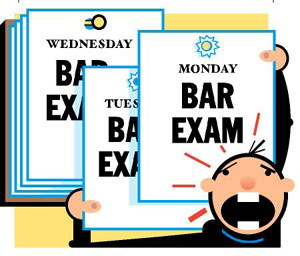
Jamie Zadra
Director of Bar Success
Phone: 717.541.3919
Email: jlzadra@widener.edu
Bar Exam Preparation
featuring Associate Professor of Legal Methods David Raeker-Jordan
Bar admission requirements are promulgated by each state. The most common testing configuration consists of a two-day bar examination. One day of testing is devoted to the Multistate Bar Examination (MBE) and the second day is typically comprised of essays from a broad range of subject areas prepared by the board of bar examiners of each state.
The Multistate Essay Examination (MEE) consists of six 30-minute questions administered by user jurisdictions as part of the bar examination on the Tuesday before the last Wednesday in February and July of each year. The MEE is only one of a number of measures that a board of bar examiners may use in determining competence to practice. Each jurisdiction grades the MEE and determines its own policy with regard to the relative weight given to the MEE and other scores. Jurisdictions that administer the Uniform Bar Examination weight the MEE component 30%.
The Uniform Bar Exam (UBE) is coordinated by NCBE and is composed of the Multistate Essay Examination (MEE), two Multistate Performance Test (MPT) tasks, and the Multistate Bar Examination (MBE). It is uniformly administered, graded, and scored by user jurisdictions and results in a portable score that can be transferred to other UBE jurisdictions. The UBE is administered over two days, with the MBE given on the last Wednesday of February and July and the MEE and MPT given on the Tuesday prior to that. Jurisdictions that use the UBE may also require applicants to complete jurisdiction-specific law component. The UBE is designed to test knowledge and skills that every lawyer should be able to demonstrate prior to becoming licensed to practice law. It results in a portable score that can be used to apply for admission in other UBE jurisdictions.
Since qualifications for admission to the bar varies in every U.S. jurisdiction, applicants are encouraged to determine the requirements for any jurisdiction in which they intend to seek admission by contacting the jurisdiction. For up-to-date bar admission information, contact the bar administrator for the specific jurisdiction.
Consult these sites to learn more about each state’s Bar Admission and Exam requirements:
National Conference of Bar Examiners
State Character and Fitness Investigations
For an overview of bar requirements for all states consult the American Bar Association (ABA) Comprehensive Guide to Bar Admission Requirements.
Links to all State Boards of Bar Examiners are available from the National Conference of Bar Examiners.
